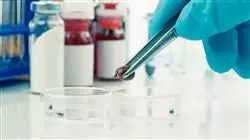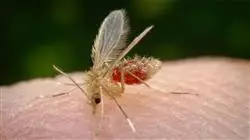University certificate
The world's largest faculty of pharmacy”
Introduction to the Program
Thanks to this program that TECH offers, you will be able to specialize in infectious pathologies and improve your skills as a pharmacist"

Among the infectious diseases of major global importance is malaria, endemic in more than 100 countries, where the goal is to reduce mortality by at least 20% from that observed in 2005 in at least 75 countries; Tuberculosis is another of the world's serious infectious problems, with some 8 million new cases per year and more than 1 million deaths, 20% of which are associated with HIV/AIDS infection, with problems of resistance to treatment and lack of compliance with treatment, which led the WHO to consider tuberculosis a global health emergency in 1993.
On the other hand, there is HIV/AIDS, the great pandemic, with more than 1.8 million adults dying in 2016 and more than 600,000 children under 15 infected in a single year, and for which current treatment (as well as prevention of vertical transmission) is beyond the reach of many in developing countries, with numerous cases of resistance to the antiretroviral drugs used already detected.
In addition to these three diseases it should be noted that despite scientific advances in Care Services science, public health development and the pharmaceutical and biotechnology industry, there are infectious diseases prevalent throughout the world that continue to have high morbidity and mortality rates, such as pneumonia, infectious diarrhoea, urinary tract infections, nosocomial infections, arbovirosis and intestinal parasitism.
All of this is alarming when one considers all the new infectious diseases that have emerged in the last 20 years with epidemic behaviour, such as severe acute respiratory syndrome, Chikingunya and more recently Zika.
This provides the opportunity to study a teaching program that brings together the most advanced and in-depth knowledge of important health problems in the field of infectious diseases and antimicrobial treatment, where a group of internationally experienced professors will provide students with the most up-to-date information for the diagnosis, treatment and care of patients with prevalent and life-threatening diseases.
In addition, this Professional master’s degree is updated so you will also have access to the most accurate and effective information on the functioning of Coronavirus infections froma pharmaceutical point of view"
This Professional master’s degree in Clinical Infectious Diseases and Advanced Antibiotic Therapeutics contains the most complete and up-to-date educational program on the market. The most important features of the training include:
- The development of practical cases presented by experts in infectious diseases
- The graphic, schematic, and practical contents with which they are created, provide scientific and practical information on the disciplines that are essential for professional practice
- Practical exercises where self-assessment can be used to improve learning
- Its special emphasis on innovative methodologies
- Theoretical lessons, questions to the expert, debate forums on controversial topics, and individual reflection assignments
- Content that is accessible from any fixed or portable device with an Internet connection
TECH allows you to train with the best teaching staff and the best content without sacrificing maximum scientific rigor. This Professional Master's Degree is everything your career needs to start advancing"
The program includes in its teaching staff, professionals from the sector who bring to this training the experience of their work, in addition to recognized specialists from prestigious reference societies and universities.
The multimedia content, developed with the latest educational technology, will provide the professional with situated and contextual learning, i.e., a simulated environment that will provide immersive training programmed to train in real situations.
This program is designed around Problem Based Learning, whereby the professional must try to solve the different professional practice situations that arise during the academic year. For this purpose, the student will be assisted by an innovative interactive video system created by renowned and experienced experts.
This program, updated in April 2020, is the best in the educational landscape in clinical infectious diseases and advanced therapeutics for pharmacists"

Get to know all the latest information on COVID-19 Don't miss the opportunity and get up-to-date on advances in the treatment of the infections to incorporate them into your daily Care Services practice"
Why study at TECH?
TECH is the world’s largest online university. With an impressive catalog of more than 14,000 university programs available in 11 languages, it is positioned as a leader in employability, with a 99% job placement rate. In addition, it relies on an enormous faculty of more than 6,000 professors of the highest international renown.

Study at the world's largest online university and guarantee your professional success. The future starts at TECH”
The world’s best online university according to FORBES
The prestigious Forbes magazine, specialized in business and finance, has highlighted TECH as “the world's best online university” This is what they have recently stated in an article in their digital edition in which they echo the success story of this institution, “thanks to the academic offer it provides, the selection of its teaching staff, and an innovative learning method aimed at educating the professionals of the future”
A revolutionary study method, a cutting-edge faculty and a practical focus: the key to TECH's success.
The most complete study plans on the university scene
TECH offers the most complete study plans on the university scene, with syllabuses that cover fundamental concepts and, at the same time, the main scientific advances in their specific scientific areas. In addition, these programs are continuously being updated to guarantee students the academic vanguard and the most in-demand professional skills. In this way, the university's qualifications provide its graduates with a significant advantage to propel their careers to success.
TECH offers the most comprehensive and intensive study plans on the current university scene.
A world-class teaching staff
TECH's teaching staff is made up of more than 6,000 professors with the highest international recognition. Professors, researchers and top executives of multinational companies, including Isaiah Covington, performance coach of the Boston Celtics; Magda Romanska, principal investigator at Harvard MetaLAB; Ignacio Wistumba, chairman of the department of translational molecular pathology at MD Anderson Cancer Center; and D.W. Pine, creative director of TIME magazine, among others.
Internationally renowned experts, specialized in different branches of Health, Technology, Communication and Business, form part of the TECH faculty.
A unique learning method
TECH is the first university to use Relearning in all its programs. It is the best online learning methodology, accredited with international teaching quality certifications, provided by prestigious educational agencies. In addition, this disruptive educational model is complemented with the “Case Method”, thereby setting up a unique online teaching strategy. Innovative teaching resources are also implemented, including detailed videos, infographics and interactive summaries.
TECH combines Relearning and the Case Method in all its university programs to guarantee excellent theoretical and practical learning, studying whenever and wherever you want.
The world's largest online university
TECH is the world’s largest online university. We are the largest educational institution, with the best and widest online educational catalog, one hundred percent online and covering the vast majority of areas of knowledge. We offer a large selection of our own degrees and accredited online undergraduate and postgraduate degrees. In total, more than 14,000 university degrees, in eleven different languages, make us the largest educational largest in the world.
TECH has the world's most extensive catalog of academic and official programs, available in more than 11 languages.
Google Premier Partner
The American technology giant has awarded TECH the Google Google Premier Partner badge. This award, which is only available to 3% of the world's companies, highlights the efficient, flexible and tailored experience that this university provides to students. The recognition as a Google Premier Partner not only accredits the maximum rigor, performance and investment in TECH's digital infrastructures, but also places this university as one of the world's leading technology companies.
Google has positioned TECH in the top 3% of the world's most important technology companies by awarding it its Google Premier Partner badge.
The official online university of the NBA
TECH is the official online university of the NBA. Thanks to our agreement with the biggest league in basketball, we offer our students exclusive university programs, as well as a wide variety of educational resources focused on the business of the league and other areas of the sports industry. Each program is made up of a uniquely designed syllabus and features exceptional guest hosts: professionals with a distinguished sports background who will offer their expertise on the most relevant topics.
TECH has been selected by the NBA, the world's top basketball league, as its official online university.
The top-rated university by its students
Students have positioned TECH as the world's top-rated university on the main review websites, with a highest rating of 4.9 out of 5, obtained from more than 1,000 reviews. These results consolidate TECH as the benchmark university institution at an international level, reflecting the excellence and positive impact of its educational model.” reflecting the excellence and positive impact of its educational model.”
TECH is the world’s top-rated university by its students.
Leaders in employability
TECH has managed to become the leading university in employability. 99% of its students obtain jobs in the academic field they have studied, within one year of completing any of the university's programs. A similar number achieve immediate career enhancement. All this thanks to a study methodology that bases its effectiveness on the acquisition of practical skills, which are absolutely necessary for professional development.
99% of TECH graduates find a job within a year of completing their studies.
Professional Master’s Degree in Clinical Infectious Diseases and Advanced Antibiotic Therapeutics
.
The TECH Professional Master's Degree in Clinical Infectology and Advanced Antibiotic Therapeutics is a unique opportunity for pharmacy professionals looking to specialize in the fight against infectious diseases. This postgraduate degree focuses on training specialists in the identification and treatment of infections, and the responsible use of antibiotics in the context of antimicrobial resistance. This Professional Master's Degree, which is taught virtually, is divided into several modules covering topics such as clinical microbiology, antibiotic pharmacology, epidemiology, diagnosis and treatment of infections, among others. In addition, the program includes advanced training in antimicrobial therapy, which will allow the student to develop skills in the optimal use of antibiotics to reduce resistance and improve efficacy in the treatment of infections.
The best master's degree in antibiotic therapy in the world.
The best Professional Master's Degree in Infectious Diseases and Antibiotic Therapy
.
Among the benefits of this Professional Master's Degree is access to a group of experts in the field, as well as the possibility of acquiring advanced skills in the use of technologies and tools for clinical data analysis. In addition, the program focuses on the development of leadership and teamwork skills, which will allow students to face the challenges of clinical practice in the area of infectious diseases. Graduates of TECH's Professional Master's Degree in Clinical Infectious Diseases and Advanced Antibiotic Therapeutics will be trained to effectively identify and treat infectious diseases, enabling them to excel in the job market and contribute to the fight against infectious diseases in their community. If you are a pharmacy professional interested in specializing in the field of infectology and antibiotic therapeutics, this postgraduate degree is the best option for you. With a hands-on approach, the opportunity to study virtually, and advanced training in antimicrobial therapeutics, this program will allow you to acquire the skills and knowledge you need to excel in this important and challenging field.







